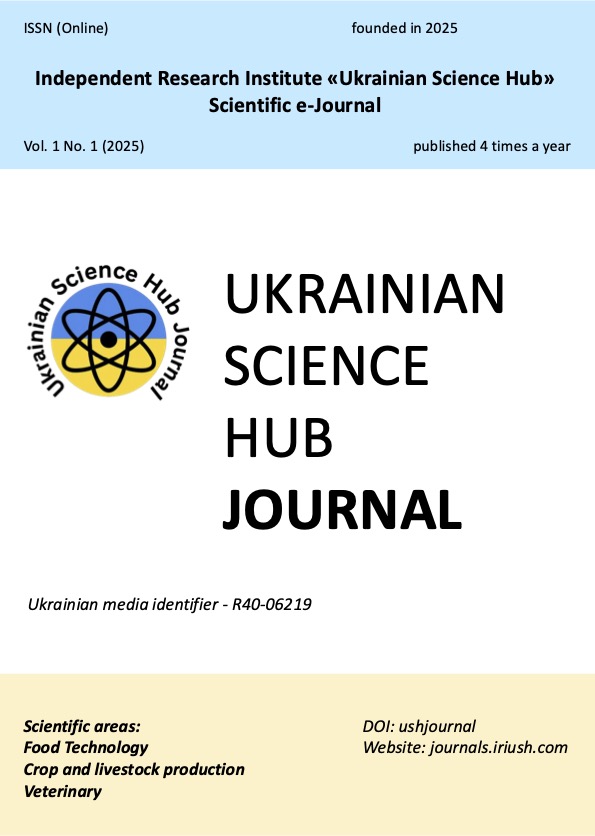STANDARDIZATION OF AGRICULTURAL COOPERATIVES: A DRAFT INTERNAL STANDARD
DOI:
https://doi.org/10.64378/iriush.journals.2025.1.5Keywords:
gricultural Cooperative, SOU (Standard of Organization of Ukraine), Organizational Requirements, Standardized Indicators, Management, Sustainable DevelopmentAbstract
The modern development of Ukraine’s agricultural sector requires effective mechanisms to improve the efficiency of agricultural cooperatives, which serve as an important tool for integrating small producers into the market environment. In conditions of insufficient regulatory guidance, the development of internal normative documents, particularly the organizational standard of Ukraine (SOU), becomes especially relevant as it defines unified rules, procedures, and performance indicators. This article presents a draft SOU for agricultural cooperatives that encompasses organizational, production, economic, social, and environmental requirements. Special attention is given to the system of standardized indicators, which enables a comprehensive evaluation of cooperative performance. The proposed indicators cover product quality, financial results, member participation, and environmental responsibility, providing a foundation for transparent monitoring and control. The project was substantiated using a systems approach, comparative analysis of international and national standards, and synthesis of best practices from cooperative operations worldwide. The study also examined the implementation of gender-oriented programs, agroecological schemes, cooperative resource management systems, energy initiatives, and entrepreneurial practices. These insights were integrated into the SOU draft, incorporating modern approaches aimed at strengthening social capital, institutional resilience, and cooperative competitiveness. The developed document can serve as a practical basis for improving cooperative management, harmonizing their activities with international norms, and fostering greater trust in Ukraine’s agri-food system.
References
Bouichou, E. H., Abdoulaye, T., Allali, K., Bouayad, A., & Fadlaoui, A. (2021). Entrepreneurial Intention among Rural Youth in Moroccan Agricultural Cooperatives: The Future of Rural Entrepreneurship. Sustainability, 13(16), 9247. https://doi.org/10.3390/su13169247.
Jasiński, J., Kozakiewicz, M., & Sołtysik, M. (2021). Determinants of Energy Cooperatives’ Development in Rural Areas—Evidence from Poland. Energies, 14(2), 319. https://doi.org/10.3390/en14020319.
Kustepeli, Y., Gulcan, Y., Yercan, M. et al. (2023). The role of agricultural development cooperatives in establishing social capital. Ann Reg Sci 70, 681–704. https://doi.org/10.1007/s00168-019-00965-4.
Lavruk, V., Slavina, N., Lavruk, O. (2022). Management of the development of agricultural serving dairy cooperatives: problems and prospects. Agrosvit, vol. 9-10, pp. 36–43. https://doi.org/10.32702/2306-6792.2022.9-10.36.
Liu, M., Yang, J., Zheng, G., Shang, P., & Li, Y. (2023). External Factors Facilitating Quality Certification of Agricultural Products in China: Insights from Cooperatives in the Sichuan Province. Agriculture, 13(5), 1056. https://doi.org/10.3390/agriculture13051056.
Lysyak, O. I. (2022) Some legal problems of membership in an agricultural cooperative and ways to overcome them Retrieved from http://repository.hneu.edu.ua/handle/123456789/29775.
Mamchur, V. & Studinska, G. (2025) Theoretical principles of project management of innovative development of the agrarian sphere. Socio-Economic Problems and the State (electronic journal), Vol. 32, no. 1, pp. 65-79. URL: https://doi.org/10.33108/sepd2025.01.065.
Marenich, T., & Smihunova, O. (2024). INTEGRATION OF ESG STANDARDS INTO THE DEVE- LOPMENT STRATEGY OF AGRICULTURAL ENTERPRISES IN UKRAINE. Zeszyty Naukowe Wyższej Szkoły Technicznej w Katowicach, (19), 117-130. https://doi.org/10.54264/0103.
Mirakin, В. (2024). Organizational and economic principles of functioning of the cooperative structure in agriculture. Innovation and Sustainability, (3), 177–185. https://doi.org/10.31649/ins.2024.3.177.185.
Mungmai, R., Sutthikun, W., & Kuanrudee, H. (2022). Evaluating Efficiency of Internal Control in Agricultural Cooperatives in Ubon Ratchathani Province. Journal of Legal Entity Management and Local Innovation, 8(11), 298-312.
Pavliuk S., Kuzoma V., Musienko D. (2022). Implementation of the HACCP system for agricultural enterprises: necessity and support. Modern Economics, 32(2022), 75-83. DOI: https://doi.org/10.31521/modecon.V32(2022)-10.
Prager, K. (2022). Implementing policy interventions to support farmer cooperation for environmental benefits. Land Use Policy, 119, 106182. https://doi.org/10.1016/j.landusepol.2022.106182.
Prydatchenko, M. Yu., Melnyk, V. O. (2024). Legal regulation of the activities of agricultural cooperatives. Retrieved from http://rep.btsau.edu.ua/handle/BNAU/11676.
Romanchuk, I., Verbytskyi, S., Kozachenko, O., Patsera, N., & Verbova, O. (2024). CURRENT STATE OF TECHNICAL REGULATION IN THE FIELD OF EQUIPMENT FOR THE FOOD INDUSTRY. FOOD RESOURCES, 12(22), 150–163. https://doi.org/10.31073/foodresources2024-22-16.
Rui, G. U., Feng-ying, N. I. E. (2021). Does empowering women benefit poverty reduction? Evidence from a multi-component program in the Inner Mongolia Autonomous Region of China. Journal of Integrative Agriculture, 20(4), 1092-1106. https://doi.org/10.1016/S2095-3119(20)63436-0.
Skorokhod, I., Pavlov, K., Pavlova, O., & Sychuk, O. (2025). Development and management of industry-specific scientific projects in the field of organic production. Herald of Khmelnytskyi National University. Economic Sciences, 338(1), 383-389. https://doi.org/10.31891/2307-5740-2025-338-56.
Tomilin, O., & Bahalika, T. (2023). Development of cooperative processes in agriculture. Economy and Society, (58). https://doi.org/10.32782/2524-0072/2023-58-75.
Zhang, C. H., & Benjamin, W. A. (2021). The contribution of cooperative irrigation scheme to poverty reduction in Tanzania. Journal of integrative agriculture, 20(4), 953-963. https://doi.org/10.1016/S2095-3119(21)63634-1.
Downloads
Published
Issue
Section
License

This work is licensed under a Creative Commons Attribution-NonCommercial-ShareAlike 4.0 International License.


